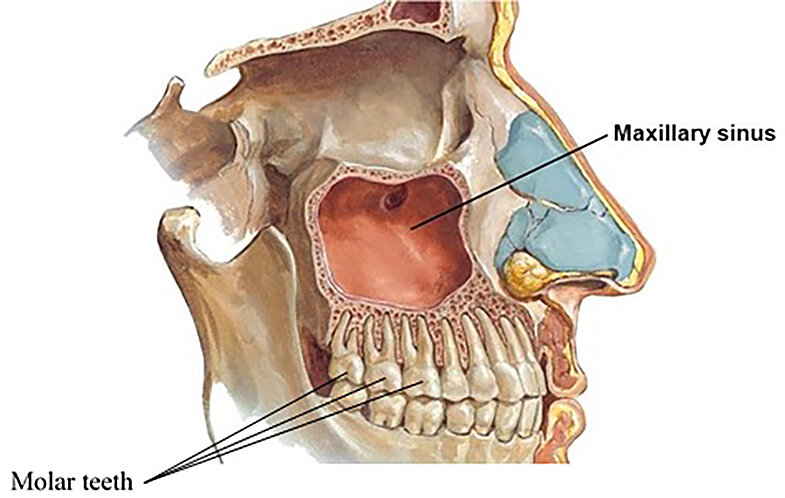Toothache or Sinus Pressure?
How to Spot the Difference Between These Two Similar Pains
Allergy season is upon us and with it can come some troubling symptoms. But don’t fear! We discuss the possible causes, symptoms, and treatments for pesky pains in your teeth, so you may better understand when it’s time for a dental appointment.
They’re All Connected…Especially if You’re Congested!
Sometimes, what seems like pain in our teeth isn’t related to our teeth at all. In fact, tooth pain can be caused by pressure or congestion from your sinuses. But why?
The largest sinuses in the body are located right above the back teeth of the upper jaw. Because of their close proximity, the roots of our upper teeth can sometimes extend into the sinus cavity heightening the potential for sensitivity in relation to sinus irritation and inflammation. This is why allergies, sinus infections, and even the common cold can cause our back upper teeth to hurt. When pressure or drainage happens, the roots of our teeth get ‘angry’ and give us a nasty toothache.
Signs, Symptoms, and Differences
When experiencing tooth pain, there are a few distinct details and symptoms than can help you distinguish if you are experiencing sinus pressure pain or a genuine toothache. If you’re questioning the cause of your toothache, it’s important to ask yourself the following who, what, where, when, and how’s:
Who are you? One thing to consider is if you are predisposed to sinus problems. If you have frequent sinus infections, bad allergies, symptoms of a cold (i.e. fever, fatigue, cough, runny nose), or other related problems, a safe bet is you’re experiencing complications from sinus symptoms.
What are you sensitive towards? With tooth pain related to sinus pressure, you won’t have sensitivity to hot or cold. Instead of this, odds are it will hurt to chew or bite.
Where is your pain? If your pain is being caused by sinus pressure, your upper rear teeth and molars will hurt, although sometimes it can jump to your lower rear teeth—known as ‘referred pain.’ Another telltale sign of sinus pressure toothaches is the amount of teeth affected. If you’re suffering from sinus issues, multiple teeth will be affected rather than individual ones.
When does it hurt? Is pain intensified with movement? When you jump or bend over, sinus pressure shifts and can be felt more in your teeth. Subsequently, pain may be reduced when sitting or lying down.
How does it hurt? Teeth that hurt due to dental concerns will be singular as well as more intense and focused. Sinus related toothaches present themselves continuously and don’t typically experience sharp pains, rather, a dull ache or occasional throbbing with movement.
By answering these questions, hopefully you will be one step closer to effectively treating your pain!
Treating Your Toothache
If you’re experiencing what you believe is sinus pressure pain, taking medication with a decongestant should reduce inflammation and give you some relief. That being said, if you are experiencing a toothache that isn’t related to your sinuses, there are a few ways to treat it—both medically and holistically.
Over-the-Counter Pain Relievers. Using medications like ibuprofen, acetaminophen, or aspirin help to alleviate minor toothache pains. You can also try topical solutions like Orajel which contains the numbing agent benzocaine. **Please note, products that contain benzocaine should not be used by children under the age of 2.
Cold Compress. Holding ice or an ice pack wrapped in a towel to the area in pain helps to reduce swelling that causes pain. Do this for 20-minute intervals and repeat every few hours as needed.
Rinse. Using saltwater to rinse your mouth helps relieve inflammation while treating oral wounds. Rinse for 30 seconds multiple times throughout the day.
Another rinse option is hydrogen peroxide. Using a 3% solution, dilute the hydrogen peroxide with equal parts water and rinse thoroughly. DO NOT SWALLOW!
Peppermint Tea. Peppermint has soothing qualities that can be used topically with a cooled down peppermint tea bag. Holding this against the hurting tooth and/or gums should offer some natural relief.
Clove Oil. By dabbing a minimal amount of clove oil onto a cotton ball, apply this to the painful area for a natural antiseptic that numbs pain and reduces inflammation. You can also add a drop of this oil to a glass of water and rinse.
Garlic. Believe it or not, garlic has pain relieving qualities and naturally contains the antimicrobial allicin which can kill bacteria. Make a paste using a crushed garlic clove and apply directly to the affected area.
Vanilla Extract. On the other side of the spectrum, the alcohol in vanilla extract can numb pain temporarily and contains antioxidants that assist healing. Apply a small amount topically with either your finger or a cotton ball a few times daily.
Unfortunately, at-home-remedies can only help if your toothache is due to a temporary problem and doesn’t progress. If your pain is either getting worse or not improving after a few days of at-home treatments, it’s time to seek additional help.
When It’s Time to Seek Advice
Toothaches that don’t improve with available resources or even worsen with treatment are a sign that something might be wrong with the tooth or teeth in question. Making an appointment right away with your dentist is important to learning what the problem is and fixing it before it can become worse.
What will the dentist do? After discussing when the pain started, how severe it is and where it is located, your dental team will give a physical exam where your mouth, teeth, gums, jaw, tongue, throat, sinuses, ears, nose, and neck will be evaluated. If necessary, dental x-rays may even be completed to try and locate the source of your pain.
From there, treatment depends on the cause of your toothache. If you have a cavity, the dentist will fill the cavity or remove the tooth if necessary. Depending on the severity of potential tooth decay or infection, a root canal may be needed to remove damaging bacteria that is causing an infection inside your tooth. If you are experiencing a fever or swelling in your jaw, an antibiotic may be prescribed to help your body fight infection.
Remember, the best way to prevent serious toothaches is by having regular dental appointments and maintaining healthy oral hygiene habits. A healthy smile is attainable, especially with help from Alexandria Smiles!
Want to Learn More About Dental Care?
Here are some other posts you may want to read:
Do You Have Sensitive Teeth?
Stop tooth sensitivity with these helpful tips.
Root Canals: Not as Scary as You Think
Why you shouldn’t be afraid of this necessary procedure.
It’s Never Too Late to Take Care of Your Teeth!
Why age is just a number when it comes to your mouth.






